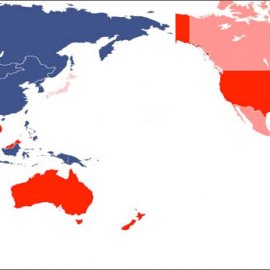Trans-Pacific Partnership and the Ocean
-
English
-
ListenPause
I’m Peter Neill, Director of the World Ocean Observatory. World governments are conducting a new conversation regarding the inherent tension between the elimination of most trade constraints advocated by corporations, investors, and some economists and environmental protections advocated by environmentalists and labor who point to the already adverse impact of such unregulated exchange as evinced by actions taken by the World Trade Organization and the North American Free Trade Agreement (NAFTA). The conflict has risen again in the proposed Trans Pacific Partnership under negotiation and consideration by 12 countries from Asia and the Americas and pertaining to complex and complicated attempts to manage a global economy that now includes the growing, successful trade-based economies of Pacific nations. The debate is intense and further confused by the lack of information available to the public and even to many of the elected officials who must vote to accept conditions of which they are not fully aware. The deliberate secrecy may have its justifications, but not in a society that prides itself on transparency and open discussion of the issues. Deliberations have been going on for eight years, and still we know virtually nothing about the specific terms and possible impacts. Enter Edward Snowden and Wikileaks, which in 2014 published the draft chapter on environmental issues many of which directly affect the ocean. In January 2015 an analysis of the draft chapter was published in The New York Law Journal by Stephen L. Kass of the New York firm Carter Ledyard & Milburn that provides interesting insights into the prospective terms of the proposed agreement. Past such agreements hardly referred to environmental issues at all and the consequence is the basis for much of the current opposition. The TPP environmental chapter has sub-sections on fisheries protection, endangered species, climate change, corporate conduct, conflict resolution, and enforcement. It addresses compliance with prior multi-lateral environmental agreements such as the Convention on International Trade in Endangered Species, the Convention on Marine Pollution, the Ramsar Convention on Wetlands, and several more. Environmental groups' reaction to these terms is mixed. Many have actively objected that the new agreement dilutes the required standards and enforcement obligations of these prior commitments by allowing individual nations options to dilute, ignore, or fail to enforce—in other words to weaken environmental protections already established. Further, according to Kass’s analysis, “alleged violations of TPP environmental commitments are subject to a lengthy three-stage consultation process…virtually guaranteed to require several years of negotiations which, if successful, lead to arbitration before a specially constituted arbitral panel whose only power is to issue report determining whether the alleged violation has occurred and, if so, to require the disputing parties to ‘endeavor to agree’…on a mutually satisfactory action.” If you follow that, you will have followed a long and inconclusive quasi-judicial process that takes you right back to where the disagreement started. With regard to illegal, unreported, and unregulated fishing (IUU), Kass points out that while the language includes numerous and welcome commitments to protection of wild fish-stocks, marine mammals, and ocean pollution, the document “suffers from an ineffective enforcement provision,” as well as weak language on certain practice (shark-finning, for example) trade in threatened and endangered species, and fishing subsidies that create known unfair practices that contribute to over-fishing and declining stocks. Regarding climate change, the language seems even weaker, allowing actions to “reflect domestic circumstances and capabilities,” which Kass concludes in the United States “means no foreseeable federal legislation.” Given the exceptions, conventional behaviors, and voluntary commitment, it seems as if climate action comes down to, “sharing information and experiences.” Kass makes one key observation regarding US involvement and leadership leverage in this debate: our lack of political creditability and standing as a result of our failure to ratify earlier relevant treaties -- from the Kyoto Protocol on climate to the UN Convention on the Law of the Sea – failures that do not provide moral or actual leadership by which to hold others to account. That ocean issues are included in this proposed international agreement is to be of course welcomed. But not as “blue wash,” language that means nothing when it comes to behaviors in the ocean left unchanged because we could not mean what we say, or say what we mean. We will discuss these issues, and more, in future editions of World Ocean Radio.
The 12-nation Trans-Pacific Partnership has been causing conflict of late, with a broad range of disagreements over key provisions and debates intensifying due to lack of information available to the public. In this episode of World Ocean Radio, host Peter Neill will discuss climate and environment as it relates to the agreement, and will cite from a draft analysis on environmental issues recently published in the New York Law Journal by Stephen L. Kass which provides interesting insight into the prospective terms of the proposed agreement.
About World Ocean Radio:
Peter Neill, Director of the World Ocean Observatory and host of World Ocean Radio, provides coverage of a broad spectrum of ocean issues from science and education to advocacy and exemplary projects. World Ocean Radio, a project of the World Ocean Observatory, is a weekly series of five-minute audio essays available for syndicated use at no cost by college and community radio stations worldwide. A selection of episodes is now available in Portuguese, Spanish, French, and Swahili. In 2015 we will add Mandarin to our roster of global languages, enabling us to reach 75% of the world's population. For more information, visit WorldOceanObservatory.org/world-ocean-radio-global.
Image Credit: YesMagazine.org
- Login to post comments



